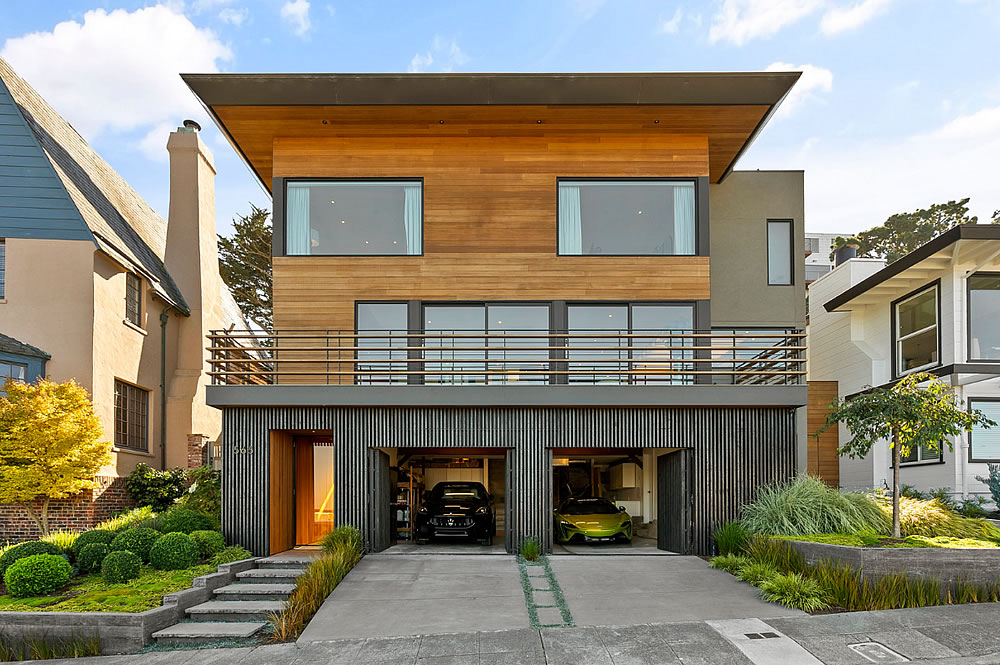Purchased for $2.65 million in July of 2016, the stately home with panoramic views, a detached guest cottage and a park-like garden setting at 565 Ortega Street, “perched majestically atop Golden Gate Heights” on a 6,365-square-foot lot, returned to the market priced at $5.95 million four months ago and is now pending!
“Nestled in an affluent and coveted enclave,” the five-bedroom property, which includes the guest house, “offers a blend of extraordinary features, impeccable workmanship, and luxurious materials that’s without equal,” having been designed by architect John Lum to yield a “one-of-a-kind masterpiece” that “seamlessly blends modernism with the Japanese aesthetic of Wabi-Sabi.”
When purchased for $2.65 million in 2016, however, the already “AWESOME HOME!” with panoramic views, detached guest cottage and park-like garden setting looked and lived a little different:
And in fact, “over $4.5 million” was subsequently invested in the redesign and renovation of 565 Ortega between 2016 and today, a renovation budget of over $1,000 per square foot, a budget that isn’t, or at least hasn’t been, out of line for high-end projects locally, at least not at retail.











Personally, I think if you appeal your assessment, as this owner seems to have done in 2021, any sale in excess of the assessment should just go directly to the government.
How long of a clawback period are you imagining? What if improvements that increase the value are made during that period? What if the appeal was made during the middle of a global pandemic that suppressed the local real estate market?
What if the owner pulled a permit valued at $400k for a $5 million job and should in fact be kicked in the teeth by tax regulators? Why are you standing up for tax cheats?
Jeffrey, that’s has nothing to do with your proposal that if you successfully appeal your assessment you should have to retroactively pay taxes on the originally assessed value upon profitable sale of the home.
Since appeals must be filed every year, I think the reasonable fix is to categorically deny property tax appeals for the tax year that a permit is worked. And of course I agree one must accurately state the cost of a renovation on the permit, and that doing otherwise is a crime.
During “the middle of a global pandemic that suppressed the local real estate market” you could get a loan for close to zero real rate of interest.
then by the same token, you should not be able to sell your house for more than what your tax assessed value?
I like what you got. Tell me more.
assessed value and cost of construction/renovation are not the same thing. Just because you spend $1m on something doesn’t mean it’s worth that much in the market, and it’s the market value that determines assessed value not the cost of the thing. Construction costs psf are more than sale prices these days.
Yes but if the Assessor comes in post-renovation and writes down the value as $3 million and a short while later it sells for double that, the Assessor has committed a severe error.
a 2-story soft story. i hope the reno dealt with that.
So it was purchased for $2.65M. Renovated at cost of $1.85M. Total seller investment $4.5M. Is that what broker marketing material is trying to convey?
No.
Other interpreation would be $4.5M renovations on top of the $2.65M purchase price? Requesting clarifcation on the numbers.
Isn’t that what the text says ?? (“over $4.5 million” was subsequently invested in the redesign and renovation)
So 2.65 + >4.50 = 5.95….it’s the new math!
How to double he value of a house? Answer: More than double the amount put into it.
$7.15M invested in property by seller, who now has it pending sale at $5.95M?
That was the listing price, I would think it could be that, higher…or lower.
Yep, up there with “how to make a million bucks: start with five million, then…”
There was obviously a couple bucks laying around for the renovations, if the $400K worth of (two) vehicles in the garage pic is an indication.
Personally, I was digging the “light panel” (?) above the entire kitchen area, and some of the other touches, but then I couldn’t fully disagree with Zantage’s comment either.
So…where is the Wabi-Sabi?
BS indicators are peaking into the red. If those numbers are real, wabi-sabi must refer to the impermanence of the seller’s real estate investment?
I had the same question. Best I can tell is that rough wood surround around the fireplace might be considered a little wabi sabi. But maybe this is just a CYA statement from the builder if any mistakes are revealed. “Hey, these sheetrock panels aren’t aligned.” “Well sir, that is the essence of wabi sabi”.
I believe that’s more the concept of Omae wa bakada
and here i was just going to cry about them not redoing the sidewalk.
even leaving the curb edge so they wouldn’t have to pay the $700 permits
why do they always leave beautiful homes with ugly sidewalks. it’s like the cheapest part of the reno
This was one of the open homes on the AIASF tours last year. It came across a bit … uneven. The fireplace alcove in the living room was rather stage-like, and the mid-century ceiling treatment in the kitchen felt somewhat dated. The “remodel legacy” abounded, with oddities that are either charmingly idiosyncratic or annoying. But the whole somehow transcended the issues and came across as a residence with personality and flair. I’m sure it will resonate with the right owner.
As the owner of a home designed by a Japanese architect in the late 70s that we are currently renovating, this whole thing looks immediately dated to me — wood choices and lighting in particular.
UPDATE: Awesome View Home Fetches Twice It’s 2016 Price! But…